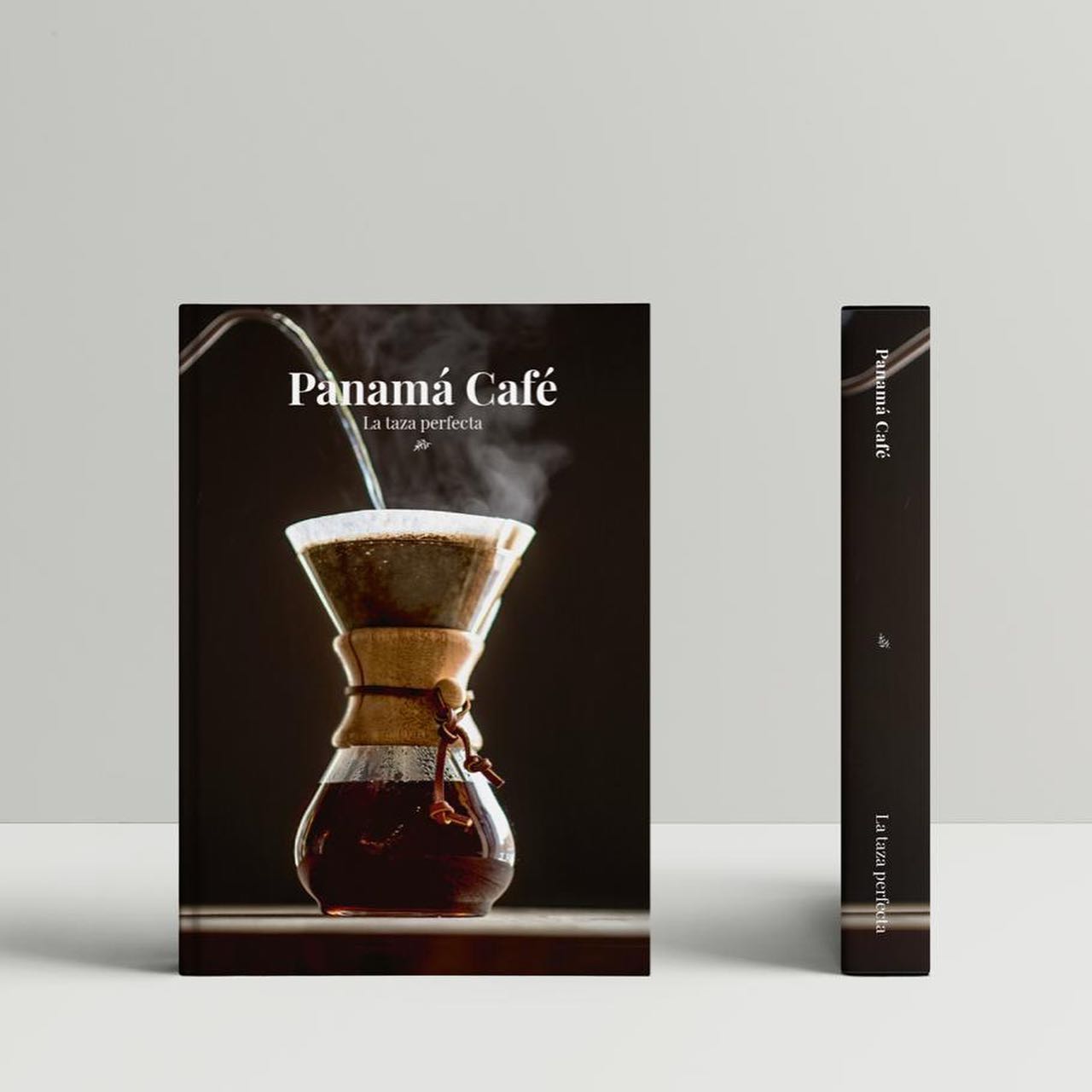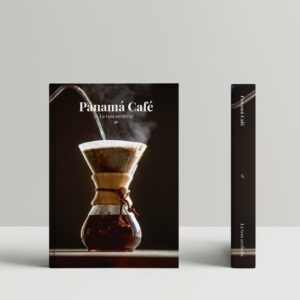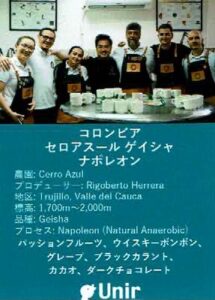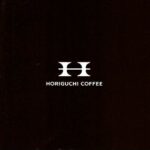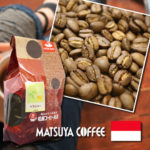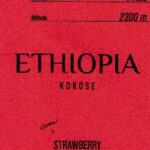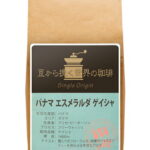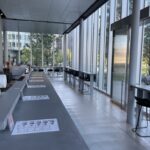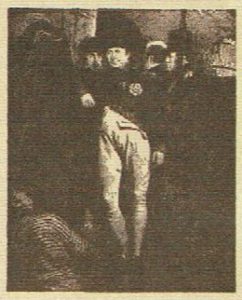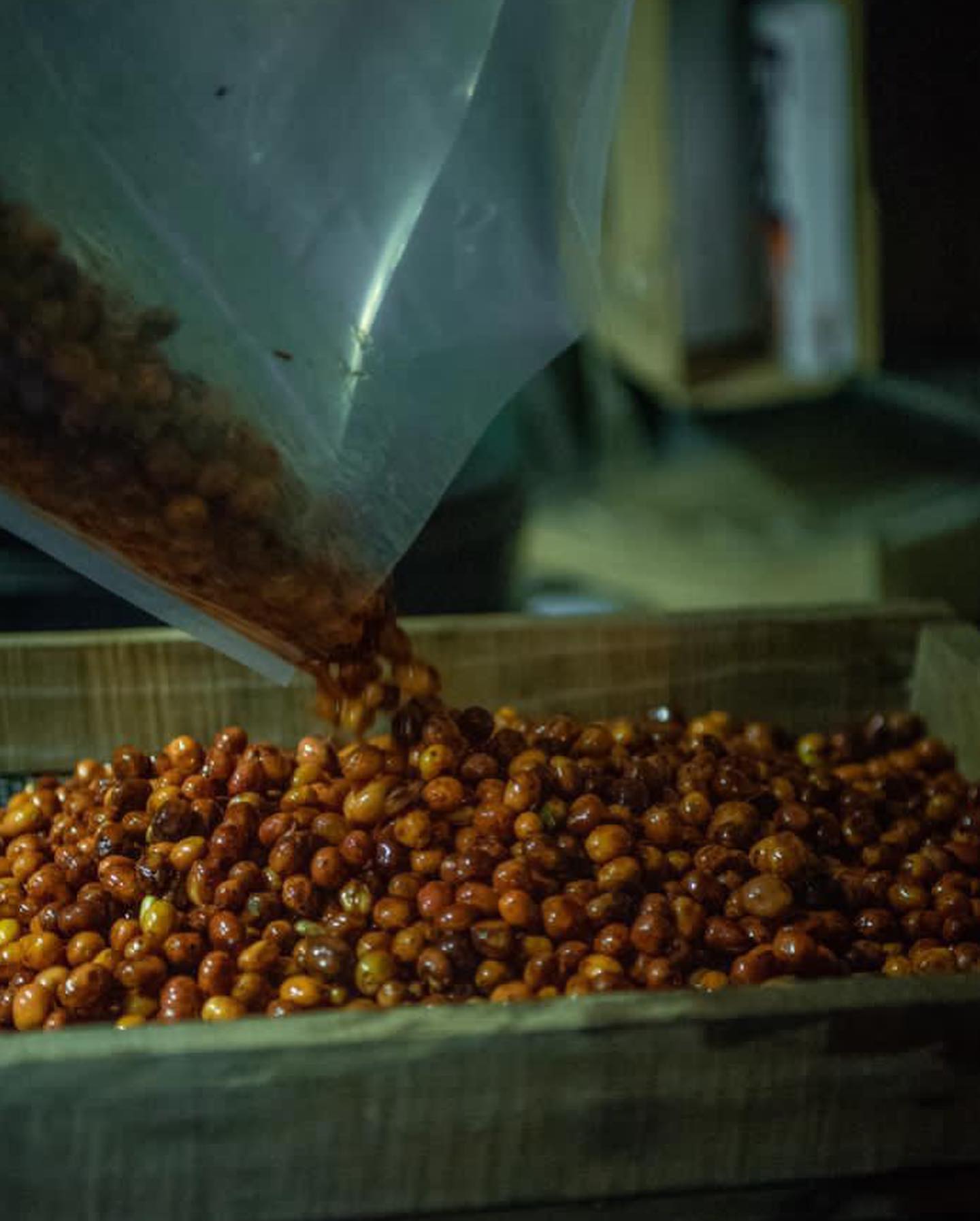
パナマのコーヒーの歴史 精製方法の伝統と革新の対立
精製方法の伝統と革新の対立
スペシャルティコーヒーの差別化の焦点は、テロワールから品種、精製方法へと移り変わっていった。
スペシャルティコーヒーのナチュラル精製の発展は、スターバックスのブラック・エプロン・エクスクルーシブス™(Black Apron Exclusives™)で2005年に発売されたシャキーナ・サン・ドライド・シダモ(Shirkina Sun-Dried Sidamo)から始まった。
シダマコーヒー農家協同組合のゼネラルマネージャー、アスナケ・ベケレは、「ナチュラル精製が、その年の最高のコーヒーを台無しにしてしまうのではないかと不安だった」と語る。「しかし、スターバックスは、プレミアム価格でコーヒーを購入することを前もって保証してくれた。これは彼らにとって大きなリスクだったが、私たちのパートナーシップに対する彼らのコミットメントを示すものだった」。
"We were nervous that the natural process would ruin our best coffees of the year," says Asnake Bekele, General Manager of Sidama Coffee Farmers Cooperative Union, Ltd. "But Starbucks guaranteed purchase of the coffee, at premium prices, up front. This was a huge risk for them, but it illustrated their commitment to our partnership."
"Savor Shirkina Sun-Dried Sidamo Exclusively at Starbucks; Taking a Risk, Starbucks Helps Create New Coffee, Potential New Revenue Stream for Farmers",3BL CSRwire 2005年10月5日.
ナチュラル精製は、コーヒーの品種とテロワール由来のフレーバーを覆い隠してしまうのではないかと懸念された。ナチュラル精製のコーヒーが市場に受け入れられた後、コーヒーの精製において付随的に起こる発酵をコントロールすることによって、新たなフレーバーを生み出すことに焦点が当たった。
しかし、これは生産者にも消費者にも、抵抗感なく受け入れられたわけではない。パナマにおいては、ラマスタス・ファミリー・エステーツ(Lamastus Family Estates)のウィルフォード・ラマスタス・シニア(Wilford Lamastus Sr.)のようなクラシックな精製のフレーバーを好む伝統主義者と、サントス・カフェ(Santos Café)のディエゴ・レスカーノ(Diego Lezcano)のような新しい精製を試みる実験主義者の、2つの立場に分かれた。
スペシャルティコーヒーの分野では比較的新しい試みだが、ナチュラル・ファーメンテーションは高級品市場を席巻している。すべてのコーヒーには付随的な発酵があるが、ナチュラル・ファーメンテーションは意図的にコーヒーをその果実に含ませたまま酵母やバクテリアにさらすプロセスとして区別される。エリダ農園の場合は、密閉したプラスチック容器に5〜10日間放り込んでおくことで行われる。微生物を長期間作用させることで、ユニークでエキゾチックなフルーツのフレーバーが得られ、1ポンドあたり800ドル、1,000ドル、5,000ドルという高値で取引される。アジアのスーパー・スペシャルティ市場ではすでに主流となっている発酵コーヒーは、オニキス・コーヒー・ラボやブラック&ホワイト・コーヒー・ロースターズのような企業を通じて、抵抗感のあるアメリカ合衆国にも入り込んできている。
しかし、発酵の急激な増加は、特にパナマにおける彼らの農園の優れたテロワールを信じる頑固な生産者の多くを落胆させた。最高に上手くいった場合は、発酵はテロワールの際立ったフレーバーを引き立てるが、最悪の場合は、そのフレーバーを完全に変化させ、コーヒーとして、ましてや神々しいパナマ・ゲイシャとして認識されなくなる。
さらに、発酵はリスクの高い作業であることも、農家が敬遠する理由のひとつである。酸素の有無、天然酵母か実験室産酵母か、高温貯蔵か低温貯蔵かなど、どのような精製方法がクロップの品質を最大化し、どの精製方法が咳止めシロップのようなフェノール類の無残なシチューになるかを発見するには、時間と資金、そしてコーヒーが必要である。ラマスタス家のエリダ農園のような「クラウンジュエル」農園では、これはあまり問題ではない。彼らのエリートの名前のブランドは、品質管理に合格していれば、どんなにファンキーでアルコール臭や薬っぽい味がしても、1ポンドごとにコーヒーが売れることを意味するのだ。しかし、優れた品質を証明することでしかバイヤーを惹きつけない小規模農園では、実験的な試みをするコーヒーが少なくなる。
Though a relatively new development in specialty coffee, Natural fermentation has taken over the luxury market. While all coffee undergoes some incidental fermentation, natural fermentation is distinguished as the intentional process of exposing the coffee, still contained within its fruit, to yeasts or bacteria. This is done, in the case of Elida Estate, by tossing the coffee in a sealed plastic container for five to 10 days. Allowing microbes to work on coffee for prolonged periods of time can offer unique, exotic fruit flavors that draw extreme prices—$800, $1,000, even $5,000 per pound. Already dominant in the Asian super-specialty markets, fermented coffees are even trickling into the recalcitrant United States through outfits like Onyx Coffee Lab and Black & White Coffee Roasters.
However, the rapid rise of fermentation dismayed many obstinate producers, especially those in Panama who believe in the superior terroir of their farms. At its best, fermentation enhances the terroir’s distinguished flavors, and at its most controversial it totally alters these flavors into a profile unrecognizable as coffee, much less as the already divine Panama Geisha.
Adding to farmers’ reluctance, fermentation is a risky game. It takes time, money, and coffee in order to discover what processing choices—with or without oxygen, native or lab-grown yeasts, hot or cold storage, etc.—maximize the quality of a crop and which turn it into a hellish stew of cough-syrup-like phenols. For the established “Crown Jewel” farms like the Lamastus family’s Elida Estate, this is less of an issue; their elite name brand means every pound of coffee will sell no matter how funky, alcoholic, or medicinal it tastes, provided it passes quality control. But for small farms that only attract buyers by proving their outstanding quality, there’s less coffee to hurl at experimentation.
Rhew Deigl"The fermentation process",Orange County Review 2021年4月17日.
パナマのクラフトビールの醸造家、カーサ・ブルーハ(Casa Bruja)のフランツ・ザイメッツ(Franz Zeimetz)は、ラマスタス・ファミリー・エステーツ(Lamastus Family Estates)の精製に協力している。
「彼のコーヒーを台無しにするかもしれない」 とフランツは同意した。「ウィルフォード・シニアは嫌がるだろうね」。
パナマのコーヒー農家は、それぞれの立場で進歩の度合いを判断している。古い純粋主義者でさえ、発酵ゲームの魅力に抵抗した人は誰もいないが、ウィルフォードのように極端なフレーバー、特に激しくファンキーなゲイシャのフレーバーを嫌う人もいる。デリケートでフローラルな品質で世界的に知られているコーヒーの品種のフレーバーを隠す必要はない、と彼は主張する。せっかくの美しいコーヒーに、異物を入れる必要はない。私もこの点では彼に同意したい、洞窟で熟成させたチーズよりも、フルーツサラダのような味のコーヒーを飲みたい。
「私たちは、あれこれと試してきた」と、彼はさまざまな発酵技術の経験について語る。「偶然に記録を更新することはないんだ」。デザイナーズ・イーストや発酵曲線、分単位の温度管理といった面倒なことをしなくても、その精製方法は高い評価と年間50万ドルほどの利益をもたらしている、と彼は主張する。
“It might ruin his coffee,” agreed Franz. “Wilford Sr. won’t like it.”
Each farmer in the Panama coffee community takes his own position on the spectrum of progressivity. Nobody—not even the old purists —has resisted the lure of the fermentation game, but some, like Wilford, frown upon the more extreme flavors, especially those of violently funky Geishas. No need to mask the flavors, he maintains, of the coffee variety that’s known world-wide for its delicate, floral qualities. No need to add foreign substances to a naturally beautiful product. I tend to agree with him on this; I’d much rather my coffee taste like a fruit salad than a cave-aged cheese.
“We’ve been around,” he says of his experience with different fermentation techniques. “We don’t break records by accident.” He makes a point; his processing methods bring in critical acclaim and around a half-million dollars a year without the hassle of designer yeasts, fermentation curves, and minute-by-minute temperature control.
Rhew Deigl"The fermentation process",Orange County Review 2021年4月17日.
ナインティ プラス(Ninety Plus)のジョセフ・ブロドスキー(Joseph Brodsky)は、新しい精製の取り組みをする生産者の中でも、独自の路線を貫いている。
一方、これらの技術をフルに活用しているのが、ナチュラル・ファーメンテーションの代名詞ともいえるナインティ プラス コーヒーのジョセフ・ブロドスキーとそのチームである。
ナインティ プラスは、その精製コーヒーだけでなく、厳しい秘密主義で広く知られている。ナインティ プラスがどのような精製を経ているのかは誰も知らないが、その一貫したユニークな製品から、彼らが従来のコーヒーとは全く異なる製品を生み出すことを恐れず、整然と精製に取り組んでいることが分かる。
ナインティ プラスは、謎めいたコーヒーと興味をそそるコーヒーを組み合わせることで、スーパースペシャルティ市場のトップバイヤーを魅了し、最近では伝説のロット#2703Aを1キロで10,000ドルで販売した。市場の反応とは裏腹に、誰もがナインティ プラスが新たな道を切り開いたと確信しているわけではない。権威あるベスト・オブ・パナマのコンペティションでは、発酵によってジャスミン、オレンジ、レモングラスといったゲイシャのトレードマークのフレーバーが完全に覆い隠されたとして、ナインティ プラスで精製された出品物が拒否された。このとき、体制側は革新に対して、伝統の一線を引いたのである。
Fully embracing these technologies, on the other hand, are Joseph Brodsky and his team at Ninety Plus Coffee, a name synonymous with natural fermentation.
Ninety Plus is widely known not only for their processed coffee but also for their severe secrecy. No one knows what goes into Ninety Plus’s famed processes, but it’s evident from their consistent, unique output that they approach processing methodically and without the fear of creating a product totally unlike traditional coffee.
By combining mystery and intrigue with completely baffling coffees, Ninety Plus have captured the top buyers of the super-specialty market, recently selling a single kilo of their fabled Lot #2703A for $10,000. Despite the market response, not everyone is convinced that Ninety Plus is selling the new way forward. The prestigious Best of Panama competition rejected a Ninety Plus-processed submission because the fermentation totally masked the trademark Geisha flavors of jasmine, orange and lemongrass. In doing so, the establishment held a line of tradition against the progressives.
Rhew Deigl"The fermentation process",Orange County Review 2021年4月17日.
コーヒーの科学的征服は可能だろうか?発酵の実験はその手がかりを与えてくれるだろうか?
フランツが農園を去る前夜、私たち2人は、精製の将来性とエリダの成長の機会について話し合いの席を持った。
「魚に使うような大きなプラスチック製のクーラーが必要だ」とフランツは想像した。「だから、コーヒーバッグが地面に触れることはない。」
「タンクに入れる前にコーヒーを殺菌する方法はあるのか?」と、私は彼に聞いてみた。
「塩を使うというのは聞いたことがある。クエン酸でもいい。でも、彼はそんなことはしないだろう」と、フランツはウィルフォード・シニアのことを言った。
私は、その通りだと思った。ウィルフォードは、1週間ほどは付き合ってくれたが、我々の夢であるコーヒーの科学的征服には消極的なままであった。時間と資本を費やしても、まだ見返りがないのだ。コーヒーの伝統と自然への敬意は、まだ揺るがない。
それでもフランツは、彼が不在の間、pHのモニタリングや2ポンドのマイクロロットの実験など、「小さな一歩」を私に指導してくれた。まるで見習いのさりげない励ましが、教祖が失敗したことを成功させるかのように。しかしフランツは、ボルカンにあるカルロスの発酵タンクに、私たちの問題、そしてパナマコーヒーの問題に対する解決策を見出した。そのタンクには、ゲイシャコーヒーと実験室育ちの酵母だけでなく、エリダ農園の未来に対する最初で最後の審判も含まれていたのである。
まだ試飲していないこれらのコーヒーが紛れもない成功を収め、強すぎずユニークであれば、ウィルフォードは一瞬でその可能性を見抜くだろう。発酵の世界をより深く、より思慮深く探求し、未知の世界を突き進み、願わくばそこにコーヒー生産の次の波を見いだすことができるだろう。もし、これがダメだったら、私たちは行き詰まり、おそらく振り出しに戻ってしまうだろう。
フランツは、まるで失うものがあるかのような表情で言った。「いいものでなければならない。そうでなければならないんだ」。
The night before Franz left the farm, the two of us sat down to discuss the potential future of processing and our opportunities for growth at Elida.
“You need one of those big plastic coolers they use for fish,” Franz imagined, “so the coffee bags never have to touch the ground.”
“Is there a way to sterilize the coffee before it goes into the tank?” I asked him.
“I’ve heard of some people using salt. You could do citric acid, too. But he’ll never do that,” Franz said of Wilford, Sr.
I feared he was right. Wilford, though willing to humor us for a week, remained unenthusiastic about our dreams of scientific coffee conquest. The investment of time and capital had not yet shown dividends. His senses of tradition and respect for the natural integrity of the coffee still stood unchallenged.
Franz nonetheless coached me on some “small steps” to take in his absence, to keep things moving—monitoring pH, experimenting with 2-pound microlots—as if the intern’s subtle encouragement could succeed where the guru had failed. But Franz recognized the solution to our problem, and the problem of all Panama coffee in general, in Carlos’s fermentation tanks in Volcán, tanks that held not only Geisha coffee and lab-grown yeast, but also the first and final judgment for the future of Elida Estate.
If those coffees—we haven’t tasted them yet—are an undeniable success, unique without being overpowering, Wilford will see their potential in an instant. They will allow us to explore the world of fermentation more deeply and more thoughtfully, to push through the unknown and hopefully, find the next wave of coffee production therein. If they’re bad, we’re stalled, and probably broken down, at square one.
Franz gave me the look of a man who had something to lose. “They have to be good. They have to.”
Rhew Deigl"The fermentation process",Orange County Review 2021年4月17日.
PODCAST #3: FRANZ ZEIMETZ SOBRE FERMENTACIÓN DE CAFÉ Y OTROS FRUTOS TROPICALES:https://www.latinofuturismo.com/podcast-3-franz-zeimetz-sobre-fermentacion-de-cafe-y-otros-frutos-tropicales/
(了)

